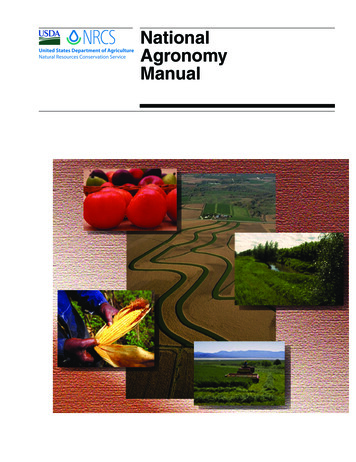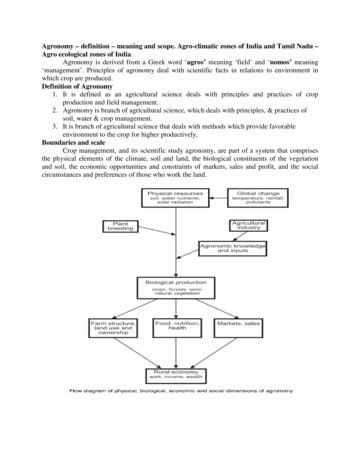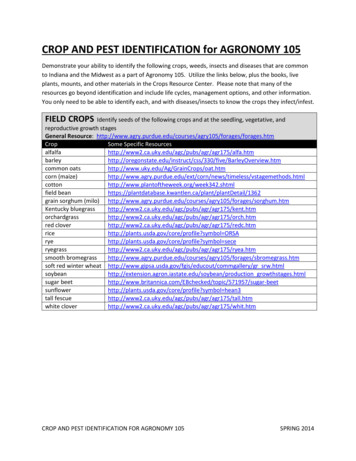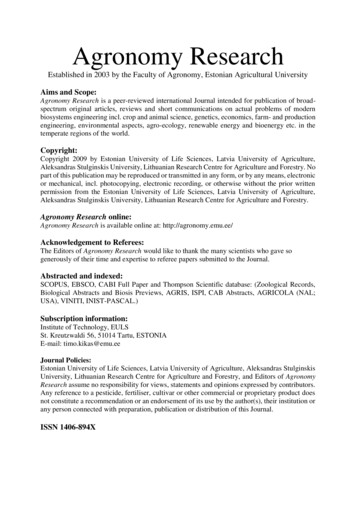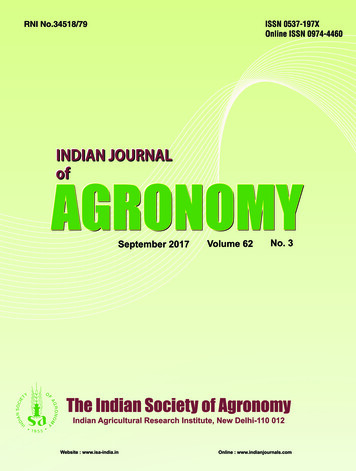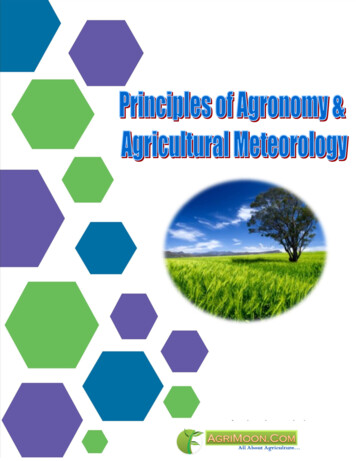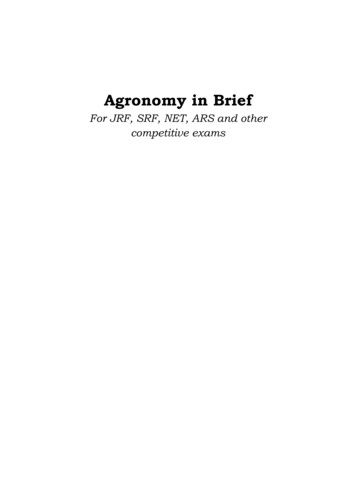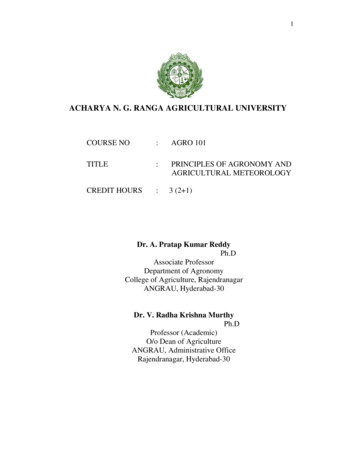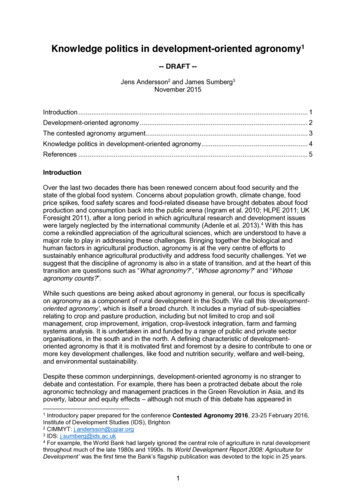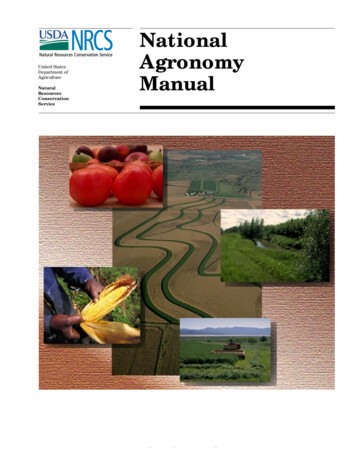
Transcription
Agronomy (AGRONOMY)AGRONOMY (AGRONOMY)AGRONOMY 100 — PRINCIPLES AND PRACTICES IN CROP PRODUCTION4 credits.Plant science applied to the growth, production, management,distribution and utilization of field crops. Enroll Info: NoneRequisites: NoneCourse Designation: Breadth - Biological Sci. Counts toward the NaturalSci reqLevel - ElementaryL&S Credit - Counts as Liberal Arts and Science credit in L&SRepeatable for Credit: NoLast Taught: Fall 2021AGRONOMY/AGROECOL/C&E SOC/ENTOM/ENVIR ST 103 —AGROECOLOGY: AN INTRODUCTION TO THE ECOLOGY OF FOOD ANDAGRICULTURE3 credits.Agroecology has blossomed across the world in recent decades as notonly a science, but also a practice, and a movement. Employ the multipledisciplines and perspectives that Agroecology affords to analyze ouragricultural and food systems wihin a broader context of dynamic socialand ecological relationships. Enroll Info: NoneRequisites: NoneCourse Designation: Breadth - Biological Sci. Counts toward the NaturalSci reqLevel - ElementaryL&S Credit - Counts as Liberal Arts and Science credit in L&SSustain - SustainabilityRepeatable for Credit: NoLast Taught: Fall 2021AGRONOMY/ENTOM/NUTR SCI 203 — INTRODUCTION TO GLOBALHEALTH3 credits.Introduces students to global health concepts through multidisciplinaryspeakers dedicated to improving health through their unique training. Ittargets students with an interest in public health and those who wish tolearn how their field impacts their global issues. Enroll Info: NoneRequisites: NoneCourse Designation: Breadth - Social ScienceLevel - ElementaryL&S Credit - Counts as Liberal Arts and Science credit in L&SSustain - SustainabilityRepeatable for Credit: NoLast Taught: Fall 2021AGRONOMY 289 — HONORS INDEPENDENT STUDY1-2 credits.Research work under direct guidance of an Agronomy faculty orinstructional academic staff member. Enroll Info: Students areresponsible for arranging the work and credits with the supervisinginstructor. Intended for students in the CALS Honors Program.Requisites: Consent of instructorCourse Designation: Honors - Honors Only Courses (H)Repeatable for Credit: Yes, unlimited number of completions1AGRONOMY 299 — INDEPENDENT STUDY1-3 credits.Research work under direct guidance of a faculty or instructionalacademic staff member. Enroll Info: Students are responsible forarranging the work and credits with the supervising instructor.Requisites: Consent of instructorRepeatable for Credit: Yes, unlimited number of completionsLast Taught: Spring 2022AGRONOMY 300 — CROPPING SYSTEMS3 credits.Agronomic cropping systems of the Midwest: environmental impacts,productivity, and profitability. Cropping system diversification andsustainable agriculture. An agroecological approach, the applicationof ecological concepts and principles for the improvement of croppingsystems is emphasized. Enroll Info: NoneRequisites: AGRONOMY 100 or graduate/professional standingCourse Designation: Breadth - Biological Sci. Counts toward the NaturalSci reqLevel - IntermediateL&S Credit - Counts as Liberal Arts and Science credit in L&SGrad 50% - Counts toward 50% graduate coursework requirementSustain - SustainabilityRepeatable for Credit: NoLast Taught: Spring 2022AGRONOMY 302 — FORAGE MANAGEMENT AND UTILIZATION3 credits.Establishment, management, harvesting and utilization of forage cropsfor use as hay, pasture and silage. Emphasis on cool season perennialgrasses and legumes. Enroll Info: NoneRequisites: Junior standing and (DY SCI/AN SCI 101, ZOOLOGY/BIOLOGY 101, ZOOLOGY/BIOLOGY/BOTANY 151, AGRONOMY 100, orBIOCORE 381) or graduate/professional standingCourse Designation: Breadth - Biological Sci. Counts toward the NaturalSci reqLevel - IntermediateL&S Credit - Counts as Liberal Arts and Science credit in L&SGrad 50% - Counts toward 50% graduate coursework requirementSustain - SustainabilityRepeatable for Credit: NoLast Taught: Fall 2021AGRONOMY/HORT/SOIL SCI 326 — PLANT NUTRITION MANAGEMENT3 credits.Functions, requirements and uptake of essential plant nutrients; chemicaland microbial processes affecting nutrient availability; diagnosis of plantand soil nutrient status; fertilizers and efficient fertilizer use in differenttillage systems. Enroll Info: NoneRequisites: (CHEM 103, 109, or 115 and SOIL SCI/ENVIR ST/GEOG 230)or SOIL SCI 301, or graduate/professional standingCourse Designation: Breadth - Physical Sci. Counts toward the Natural ScireqLevel - IntermediateL&S Credit - Counts as Liberal Arts and Science credit in L&SGrad 50% - Counts toward 50% graduate coursework requirementSustain - SustainabilityRepeatable for Credit: NoLast Taught: Spring 2022
2Agronomy (AGRONOMY)AGRONOMY/HORT 338 — PLANT BREEDING AND BIOTECHNOLOGY3 credits.Principles of transferring plant genes by sexual, somatic, and molecularmethods and the application of gene transfer in plant breeding andgenetic engineering to improve crop plants. Enroll Info: NoneRequisites: (BOTANY/BIOLOGY 130, GENETICS 466, 467, orBIOCORE 381) or graduate/professional standingCourse Designation: Breadth - Biological Sci. Counts toward the NaturalSci reqLevel - IntermediateL&S Credit - Counts as Liberal Arts and Science credit in L&SGrad 50% - Counts toward 50% graduate coursework requirementSustain - SustainabilityRepeatable for Credit: NoLast Taught: Spring 2022AGRONOMY/BOTANY/HORT 339 — PLANT BIOTECHNOLOGY:PRINCIPLES AND TECHNIQUES I4 credits.Theoretical and practical training in plant biotechnology includingmolecular biology, protein biochemistry and basic bioinformatictechniques used in fundamental and applied research on plants. Valuablehands-on training to those interested in careers in biotechnology. EnrollInfo: NoneRequisites: (ZOOLOGY/BIOLOGY/BOTANY 152 or ZOOLOGY/BIOLOGY 102) and (CHEM 104, 109, or 116) or graduate/professionalstandingCourse Designation: Level - IntermediateL&S Credit - Counts as Liberal Arts and Science credit in L&SGrad 50% - Counts toward 50% graduate coursework requirementRepeatable for Credit: NoLast Taught: Fall 2017AGRONOMY/BOTANY/HORT 340 — PLANT CELL CULTURE AND GENETICENGINEERING3 credits.Presents an overview of the techniques, biology and underlying theory ofplant tissue culture, genetic engineering and genome editing. Overviewsof research and commercial applications, and issues/challenges in thearea of plant biotechnology are also covered. Enroll Info: NoneRequisites: (BOTANY/BIOLOGY 130, ZOOLOGY/BIOLOGY/BOTANY 152,ZOOLOGY/BIOLOGY 102, or BIOCORE 381) and (CHEM 104, 109, or 116),or graduate/professional standingCourse Designation: Level - IntermediateL&S Credit - Counts as Liberal Arts and Science credit in L&SGrad 50% - Counts toward 50% graduate coursework requirementRepeatable for Credit: NoLast Taught: Fall 2021AGRONOMY/A A E/NUTR SCI 350 — WORLD HUNGER ANDMALNUTRITION3 credits.Hunger and poverty in developing countries and the United States. Topicsinclude: nutrition and health, population, food production and availability,and income distribution and employment. Enroll Info: NoneRequisites: NoneCourse Designation: Breadth - Biological Sci. Counts toward the NaturalSci reqLevel - IntermediateL&S Credit - Counts as Liberal Arts and Science credit in L&SSustain - SustainabilityRepeatable for Credit: NoLast Taught: Spring 2022AGRONOMY/ENTOM/HORT/PL PATH/SOIL SCI 354 — DIAGNOSING ANDMONITORING PEST AND NUTRIENT STATUS OF FIELD CROPS1 credit.Provides students with information necessary to diagnosis and monitorcorn, soybean, alfalfa and wheat for pests (insects, weeds, diseases) andnutrient deficiency symptoms including perspectives from Agronomy,Entomology, Horticulture, Plant Pathology and Soil Science. Proper soiland pest sampling information will be provided as will proper cropstagingtechniques which are essential for pest and nutrient management. EnrollInfo: NoneRequisites: NoneCourse Designation: Sustain - SustainabilityRepeatable for Credit: NoLast Taught: Spring 2019AGRONOMY/HORT 360 — GENETICALLY MODIFIED CROPS: SCIENCE,REGULATION & CONTROVERSY2 credits.Explores how and why genetically modified (GM) crops are created andtheir regulation at the federal and state level. Through case studies,students will learn about the impacts of GM crops and critically evaluatearguments both for and against their use. Readings and discussionintroduce students to the complex economic, cultural, and political issuessurrounding GM crops. Enroll Info: NoneRequisites: ZOOLOGY/BIOLOGY 101, BOTANY/BIOLOGY 130, ZOOLOGY/BIOLOGY/BOTANY 151, BIOCORE 381, GENETICS 466, or GENETICS 467Course Designation: Breadth - Biological Sci. Counts toward the NaturalSci reqLevel - IntermediateL&S Credit - Counts as Liberal Arts and Science credit in L&SSustain - SustainabilityRepeatable for Credit: NoLast Taught: Spring 2022
Agronomy (AGRONOMY)AGRONOMY/A A E/HORT/PL PATH 367 — INTRODUCTION TO ORGANICAGRICULTURE: PRODUCTION, MARKETS, AND POLICY3 credits.Provides an in-depth understanding of the history of organic agriculture,its production, processing, marketing, and social dimensions, and itsimpact on environmental, community, and human health. Enroll Info:NoneRequisites: ENVIR ST/AGROECOL/AGRONOMY/C&E SOC/ENTOM 103 orgraduate/professional standingCourse Designation: Breadth - Biological Sci. Counts toward the NaturalSci reqLevel - ElementaryL&S Credit - Counts as Liberal Arts and Science credit in L&SGrad 50% - Counts toward 50% graduate coursework requirementSustain - SustainabilityRepeatable for Credit: NoLast Taught: Spring 2022AGRONOMY/BOTANY/SOIL SCI 370 — GRASSLAND ECOLOGY3 credits.Understand factors driving global, continental, regional, and localdistribution of grasslands. Discuss how management affects provisionof grassland ecosystem goods and services. Compare and contrast plantcommunity and ecosystem dynamics in native prairie and intensivelymanaged pastures. Enroll Info: NoneRequisites: PL PATH/BOTANY 123, BOTANY/BIOLOGY 130, SOIL SCI/ENVIR ST 101, SOILSCI 132, ZOOLOGY/BIOLOGY/BOTANY 151,BIOCORE 381, BOTANY 100, or AGRONONY 100, or graduate/professionalstandingCourse Designation: Level - IntermediateL&S Credit - Counts as Liberal Arts and Science credit in L&SGrad 50% - Counts toward 50% graduate coursework requirementSustain - SustainabilityRepeatable for Credit: NoLast Taught: Fall 2021AGRONOMY/AGROECOL/DY SCI 371 — MANAGED GRAZING FIELDSTUDY1-2 credits.For those interested in developing a comprehensive understandingof the principles, practices, and conservation potential of managedgrazing systems, and how these farming systems may contribute to thesustainability and diverse tapestry of Wisconsin's working landscape.Visit managed grazing systems of successful grazing-based farmers(graziers) across southern/central counties in Wisconsin, and/or researchsites at UW's Arlington and/or Lancaster Research Stations and/or theDiscovery Farms Program. An opportunity to discuss at length withfarm managers and researchers the practices in place at each farm andresearch site. Includes introduction to UWEX pasture forage/nutrientmanagement planning and budgeting software. Enroll Info: NoneRequisites: Consent of instructorCourse Designation: Grad 50% - Counts toward 50% graduate courseworkrequirementSustain - SustainabilityRepeatable for Credit: NoLast Taught: Fall 20173AGRONOMY 375 — SPECIAL TOPICS1-4 credits.Special topics on issues relevant to Agronomy. Enroll Info: NoneRequisites: NoneCourse Designation: Sustain - SustainabilityRepeatable for Credit: Yes, unlimited number of completionsLast Taught: Spring 2022AGRONOMY/HORT 376 — TROPICAL HORTICULTURAL SYSTEMS1 credit.Highlight the connections between tropical plants and society through acombination of readings, writing assignments, lectures, and collaborativework. Discussions include multidisciplinary reflections on the biology oftropical plants, as well as an overview of different production systemsand some of the social and environmental problems associated with theutilization of plants in the context of local and global markets. Providesthe opportunity to demonstrate comparative skills with respect to localand international challenges posed by the topics we address in class.By the end of this course, the student will be able to make connectionsbetween horticulture and conservation, food security, nutrition, and globalhealth. Enroll Info: NoneRequisites: Junior standingCourse Designation: Level - IntermediateL&S Credit - Counts as Liberal Arts and Science credit in L&SSustain - SustainabilityRepeatable for Credit: NoLast Taught: Fall 2021AGRONOMY 377 — GLOBAL FOOD PRODUCTION AND HEALTH3 credits.Crops, food, and cropping systems from different parts of the world andtheir impact on global sustainability and health. Introduction to cropbiology, environmental requirements, and agronomic production practicesof major food crops. Environmental, socioeconomic, and health impactsof farming systems and how to assess their sustainability. For those withbroad interests in global issues, agroecology, food, environment, health,and agriculture. Enroll Info: NoneRequisites: BOTANY/BIOLOGY/ZOOLOGY 151, BIOLOGY/ZOOLOGY 101,BIOLOGY/BOTANY 130, BIOCORE 381, HORT 120, AGRONOMY 100,ENVIR ST/AGROECOL/AGRONOMY/C&E SOC/ENTOM 103, or graduate/professional standingCourse Designation: Breadth - Biological Sci. Counts toward the NaturalSci reqLevel - IntermediateL&S Credit - Counts as Liberal Arts and Science credit in L&SGrad 50% - Counts toward 50% graduate coursework requirementSustain - SustainabilityRepeatable for Credit: NoLast Taught: Spring 2022
4Agronomy (AGRONOMY)AGRONOMY 399 — COORDINATIVE INTERNSHIP/COOPERATIVEEDUCATION1-8 credits.An internship under guidance of a faculty or instructional academic staffmember in Agronomy and internship site supervisor. Enroll Info: Studentsare responsible for arranging the work and credits with the faculty orinstructional academic staff member and the internship site supervisor.Requisites: Consent of instructorCourse Designation: Level - AdvancedL&S Credit - Counts as Liberal Arts and Science credit in L&SWorkplace - Workplace Experience CourseRepeatable for Credit: Yes, unlimited number of completionsLast Taught: Summer 2021AGRONOMY 400 — STUDY ABROAD IN AGRONOMY1-6 credits.Provides an area equivalency for courses taken on Madison Study AbroadPrograms that do not equate to existing UW courses. Enroll Info: Currentenrollment in a UW-Madison study abroad programRequisites: NoneRepeatable for Credit: Yes, unlimited number of completionsAGRONOMY/DY SCI 471 — FOOD PRODUCTION SYSTEMS ANDSUSTAINABILITY3 credits.Delves into aspects of natural sciences (biology and agriculturalsciences) and social sciences underpinning the assessment of foodproduction systems as related to a variety of outcomes including butnot restricted to human and environmental health, air and water quality,greenhouse gases emission, land use, economic opportunity, socialjustice, as well as mitigation and adaptation to climate change, locally,regionally, domestically, across continents, and globally. Enroll Info: NoneRequisites: (Graduate/professional standing) or junior standing andsatisfied Quantitative Reasoning (QR) B requirementCourse Designation: Breadth - Either Biological Science or Social ScienceLevel - AdvancedL&S Credit - Counts as Liberal Arts and Science credit in L&SGrad 50% - Counts toward 50% graduate coursework requirementSustain - SustainabilityRepeatable for Credit: NoLast Taught: Spring 2022AGRONOMY 500 — SENIOR CAPSTONE EXPERIENCE2 credits.A stepping stone between the classroom and society. Emphasizesdiscussion and activities for enhancing integration of diversebodies of knowledge, critical thinking, and effective written and oralcommunication. Enroll Info: NoneRequisites: Senior standing onlyRepeatable for Credit: NoLast Taught: Spring 2022AGRONOMY/HORT 501 — PRINCIPLES OF PLANT BREEDING3 credits.Principles involved in breeding and maintaining economic crops; factorsaffecting the choice of breeding methods; alternative approaches throughhybridization and selection. Enroll Info: NoneRequisites: (GENETICS 466 or 467) and (BOTANY/BIOLOGY 130,ZOOLOGY/BIOLOGY/BOTANY 151, or BIOCORE 381) or graduate/professional standingCourse Designation: Breadth - Biological Sci. Counts toward the NaturalSci reqLevel - IntermediateL&S Credit - Counts as Liberal Arts and Science credit in L&SGrad 50% - Counts toward 50% graduate coursework requirementRepeatable for Credit: NoLast Taught: Fall 2020AGRONOMY/HORT 502 — TECHNIQUES OF PLANT BREEDING1 credit.Lab and field techniques used in breeding and maintaining economiccrops. Enroll Info: NoneRequisites: (GENETICS 466 or 467) and (BOTANY/BIOLOGY 130,ZOOLOGY/BIOLOGY/BOTANY 151, or BIOCORE 381) or graduate/professional standingCourse Designation: Breadth - Biological Sci. Counts toward the NaturalSci reqLevel - IntermediateL&S Credit - Counts as Liberal Arts and Science credit in L&SGrad 50% - Counts toward 50% graduate coursework requirementRepeatable for Credit: NoLast Taught: Spring 2019AGRONOMY/ATM OCN/SOIL SCI 532 — ENVIRONMENTAL BIOPHYSICS3 credits.Plant-environment interactions with particular reference to energyexchanges and water relations. Models are used to provide a quantitativesynthesis of information from plant physiology, soil physics, andmicrometeorology with some consideration of plant-pest interactions.Enroll Info: Students should have completed at least one course inBotany, Agronomy, or Plant Sciences to feel comfortable with the coursecontent.Requisites: BIOLOGY/BOTANY 130 and (MATH 211, 217, 221 or 275) and(PHYSICS 103, 201, 207, or 247), or graduate/professional standingCourse Designation: Breadth - Physical Sci. Counts toward the Natural ScireqLevel - IntermediateL&S Credit - Counts as Liberal Arts and Science credit in L&SGrad 50% - Counts toward 50% graduate coursework requirementRepeatable for Credit: NoLast Taught: Fall 2020
Agronomy (AGRONOMY)5AGRONOMY/C&E SOC/MED HIST/PHILOS 565 — THE ETHICS OFMODERN BIOTECHNOLOGY3 credits.AGRONOMY/ENTOM/F&W ECOL/M&ENVTOX 634 — ECOTOXICOLOGY:IMPACTS ON POPULATIONS, COMMUNITIES AND ECOSYSTEMS1 credit.An in-depth study of a selection of ethical issues arising from theapplication of modern biotechnology to microorganisms, plants, nonhuman animals, and human beings. We will aim at a discussion thatis informed by empirical research and by work done in ethical theory,political philosophy, and other relevant disciplines, and whose characteris rigorous, clear, nuanced, and unbiased. Enroll Info: NoneRequisites: Junior standingCourse Designation: Breadth - HumanitiesLevel - IntermediateL&S Credit - Counts as Liberal Arts and Science credit in L&SGrad 50% - Counts toward 50% graduate coursework requirementRepeatable for Credit: NoLast Taught: Fall 2021Focuses on the impact of toxicants on populations, communities,ecosystems, and includes risk evaluation. Includes lectures, currentresearch presentations, and discussions. Enroll Info: NoneRequisites: M&ENVTOX/AGRONOMY/ENTOM/F&W ECOL 633 or declaredin Molecular and Environmental Toxicology, PhD programRepeatable for Credit: NoLast Taught: Fall 2019AGRONOMY/AN SCI/GENETICS/HORT 615 — GENETIC MAPPING3 credits.Computing-intensive course to prepare students for genetic mappingresearch; linkage analysis and QTL mapping in designed crosses;linkage disequilibrium and association analysis (GWAS). Enroll Info:Recommended preparation is undergraduate courses in genetics andstatistics and prior experience writing R scripts (such as module 1 ofSTAT 327).Requisites: Graduate/professional standingCourse Designation: Grad 50% - Counts toward 50% graduate courseworkrequirementRepeatable for Credit: NoLast Taught: Spring 2021AGRONOMY 681 — SENIOR HONORS THESIS2-4 credits.Individual study for majors completing theses for Agronomy Honorsdegrees. Enroll Info: NoneRequisites: Consent of instructorCourse Designation: Honors - Honors Only Courses (H)Repeatable for Credit: NoLast Taught: Fall 2018AGRONOMY 682 — SENIOR HONORS THESIS2-4 credits.Individual study for majors completing theses for Honors degreesas arranged with a faculty member. Enroll Info: Requires consent ofsupervising instructor. Continuation of AGRONOMY 681. Enrolled in CALSHonors Program.Requisites: Consent of instructorCourse Designation: Honors - Honors Only Courses (H)Repeatable for Credit: NoLast Taught: Spring 2009AGRONOMY/ENTOM/F&W ECOL/M&ENVTOX 632 — ECOTOXICOLOGY:THE CHEMICAL PLAYERS1 credit.AGRONOMY 699 — SPECIAL PROBLEMS1-4 credits.Introduction to natural and man-made toxins/toxicants, their distribution,transport, and fate in the environment. Enroll Info: NoneRequisites: (CHEM 341 or 343) and ((BOTANY/BIOLOGY 130 andZOOLOGY/BIOLOGY 102) or ZOOLOGY/BIOLOGY/BOTANY 152 orBIOCORE 383); or graduate/professional standingRepeatable for Credit: NoLast Taught: Fall 2019Independent research guided by an Agronomy faculty or instructionalacademic staff member. Students are responsible for arranging the workand credits with the supervising instructor. Enroll Info: NoneRequisites: Consent of instructorCourse Designation: Level - AdvancedL&S Credit - Counts as Liberal Arts and Science credit in L&SRepeatable for Credit: Yes, unlimited number of completionsLast Taught: Spring 2022AGRONOMY/ENTOM/F&W ECOL/M&ENVTOX 633 — ECOTOXICOLOGY:IMPACTS ON INDIVIDUALS1 credit.Addresses absorption, biotransformation, elimination of toxins in a widevariety of taxa (plants, invertebrates, vertebrates). Enroll Info: NoneRequisites: M&ENVTOX/AGRONOMY/ENTOM/F&W ECOL 632Repeatable for Credit: NoLast Taught: Fall 2019AGRONOMY/AGROECOL/ENVIR ST 724 — AGROECOSYSTEMS ANDGLOBAL CHANGE3 credits.Impacts of global change drivers (climate change, atmosphericchemistry, bioenergy, urbanization, policy) on agroecosystems and theirassociated goods and services; environmental impacts of agriculturalland use and feedbacks to climate; modeling approaches; critical reviewof current scientific literature. Enroll Info: NoneRequisites: Graduate/professional standingCourse Designation: Grad 50% - Counts toward 50% graduate courseworkrequirementSustain - SustainabilityRepeatable for Credit: NoLast Taught: Fall 2021
6Agronomy (AGRONOMY)AGRONOMY 771 — EXPERIMENTAL DESIGNS1 credit.Review of methods for controlling error in research experiments; reviewand in-depth development of factorial treatment designs; theory, analysis,and examples of advanced experimental designs for plant and animalresearch. Enroll Info: Knowledge of statistics such as STAT/F&W ECOL/HORT 571 is strongly encouraged.Requisites: Graduate/professional standingCourse Designation: Grad 50% - Counts toward 50% graduate courseworkrequirementRepeatable for Credit: NoLast Taught: Spring 2022AGRONOMY 772 — APPLICATIONS IN ANOVA1 credit.Development of models, programs, inferences, and interpretations ofanalysis of variance in biological research; mixed vs. random effectsmodels and their development; choosing the correct inference range;variance and covariance analyses; repeated measures; dealing withmissing data; SAS programming. Enroll Info: Knowledge of statisticssuch as STAT/F&W ECOL/HORT 571 is strongly encouraged.Requisites: Graduate/professional standingCourse Designation: Grad 50% - Counts toward 50% graduate courseworkrequirementRepeatable for Credit: NoLast Taught: Spring 2022AGRONOMY 799 — PRACTICUM IN AGRONOMY TEACHING1-3 credits.Instructional orientation to teaching at the higher education level in theagricultural and life sciences, direct teaching experience under facultysupervision, experience in testing and evaluation of students, and theanalysis of teaching performance. Enroll Info: NoneRequisites: Consent of instructorCourse Designation: Grad 50% - Counts toward 50% graduate courseworkrequirementRepeatable for Credit: NoLast Taught: Spring 2021AGRONOMY/HORT 811 — BIOMETRICAL PROCEDURES IN PLANTBREEDING3 credits.Use of statistical methods to facilitate improvements in quantitativetraits of cultivated plants. Enroll Info: NoneRequisites: Graduate/professional standing and STAT/F&W ECOL/HORT 572Course Designation: Grad 50% - Counts toward 50% graduate courseworkrequirementRepeatable for Credit: NoLast Taught: Fall 2021AGRONOMY/HORT 812 — SELECTION THEORY FOR QUANTITATIVETRAITS IN PLANTS2 credits.Discuss advanced topics in selection theory and the utilization ofmolecular markers in selection. Enroll Info: NoneRequisites: Graduate/professional standingCourse Designation: Grad 50% - Counts toward 50% graduate courseworkrequirementRepeatable for Credit: NoLast Taught: Spring 2022AGRONOMY 875 — SPECIAL TOPICS1-4 credits.Special topics on issues relevant to Agronomy. Enroll Info: NoneRequisites: Graduate/professional standingCourse Designation: Grad 50% - Counts toward 50% graduate courseworkrequirementRepeatable for Credit: Yes, unlimited number of completionsLast Taught: Spring 2018AGRONOMY 920 — SEMINAR1 credit.Weekly seminar topics in agronomy and horticulture. Enroll Info: NoneRequisites: Graduate/professional standingCourse Designation: Grad 50% - Counts toward 50% graduate courseworkrequirementRepeatable for Credit: Yes, unlimited number of completionsLast Taught: Spring 2022AGRONOMY/ATM OCN/BOTANY/ENTOM/ENVIR ST/F&W ECOL/GEOG/ZOOLOGY 953 — INTRODUCTION TO ECOLOGY RESEARCH AT UWMADISON1-2 credits.Introduces new graduate students to the diversity of ecologistsacross the UW-Madison campus. Includes discussions of key topics inprofessional development, research presentations by faculty members,and discussions of assigned papers with senior graduate students. EnrollInfo: NoneRequisites: Graduate/professional standingCourse Designation: Grad 50% - Counts toward 50% graduate courseworkrequirementRepeatable for Credit: NoLast Taught: Fall 2021AGRONOMY/GENETICS/HORT 957 — SEMINAR-PLANT BREEDING1 credit.Graduate seminar in Plant Breeding Plant Genetics (PBPG) that requiresstudents to give oral scientific presentations on topics chosen bythe instructors and/or the student¿s thesis research. This seminar iscoordinated by PBPG faculty on a rotating basis. Enroll Info: NoneRequisites: Graduate/professional standingCourse Designation: Grad 50% - Counts toward 50% graduate courseworkrequirementRepeatable for Credit: Yes, unlimited number of completionsLast Taught: Spring 2022
Agronomy (AGRONOMY)AGRONOMY 990 — RESEARCH1-9 credits.Independent writing and research to complete thesis or dissertationrequirements. Enroll Info: NoneRequisites: Consent of instructorCourse Designation: Grad 50% - Counts toward 50% graduate courseworkrequirementRepeatable for Credit: Yes, unlimited number of completionsLast Taught: Spring 20227
AGRONOMY/ENTOM/HORT/PL PATH/SOIL SCI 354 — DIAGNOSING AND MONITORING PEST AND NUTRIENT STATUS OF FIELD CROPS 1 credit. Provides students with information necessary to diagnosis and monitor corn, soybean, alfalfa and wheat for pests (insects, weeds, diseases) and nutrient deficiency sympto
